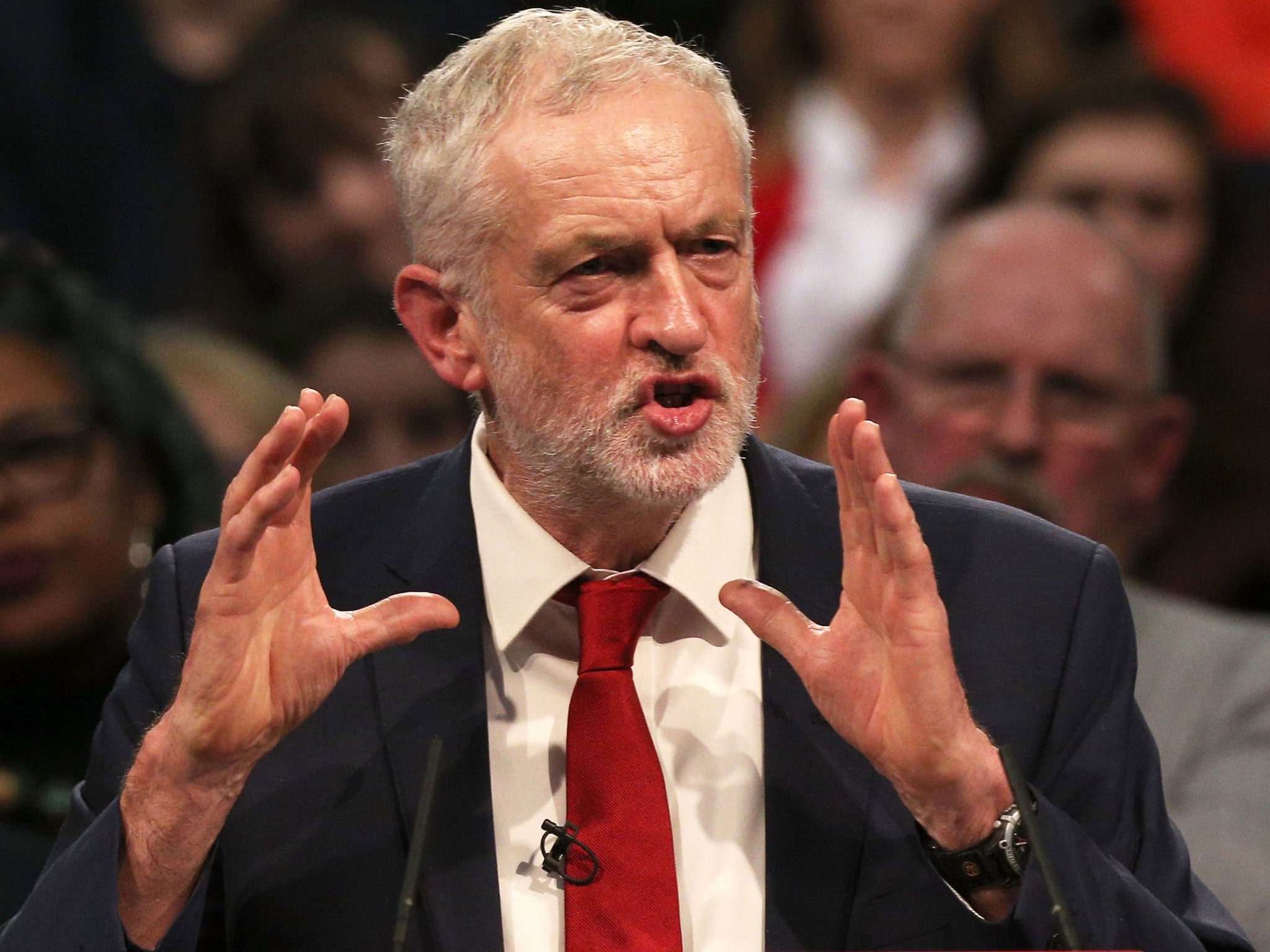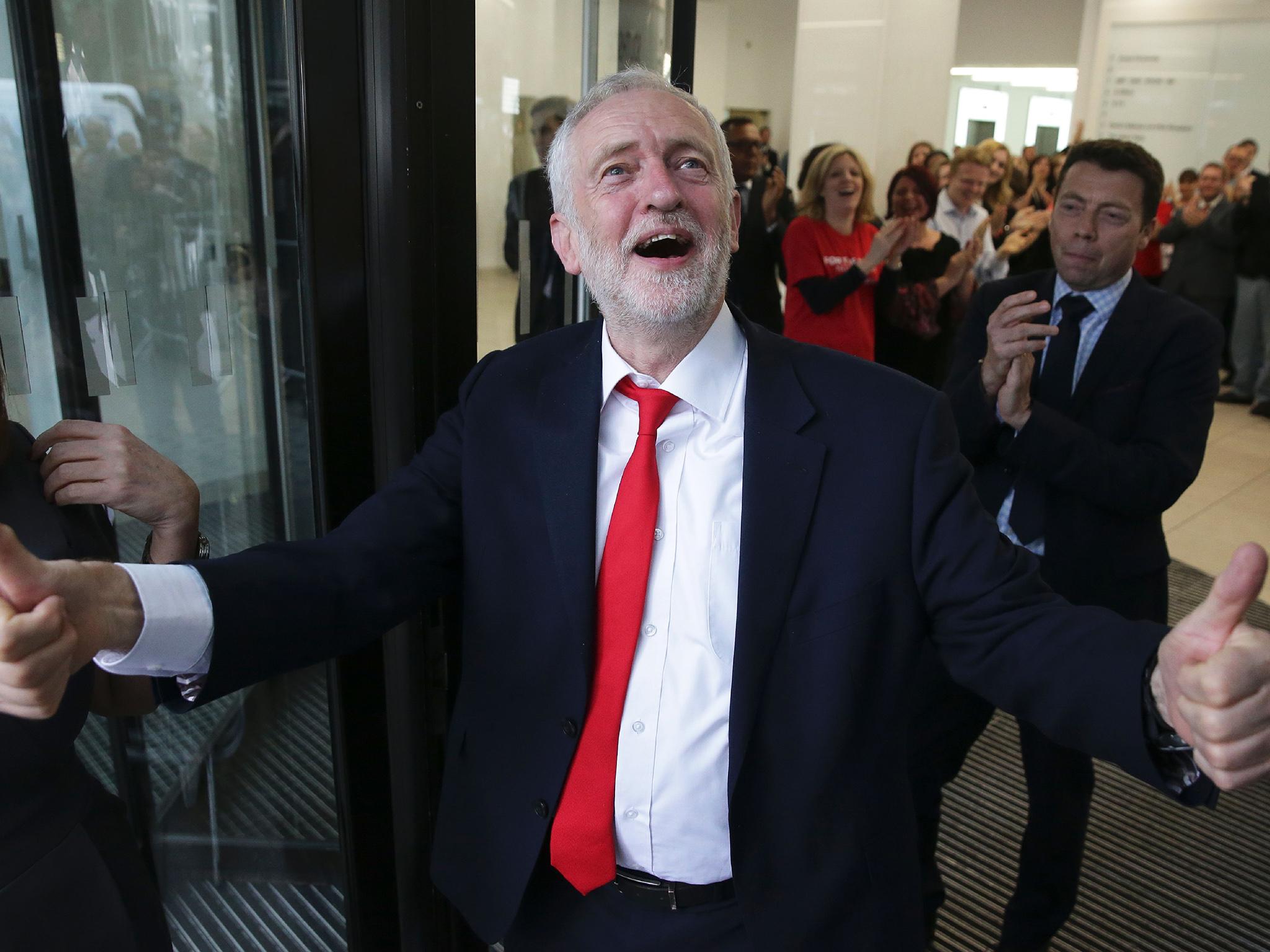Jeremy Corbyn declares he will keep up Labour momentum until 2022 election: 'We've got lots of energy'
Exclusive: The Labour leader speaks to The Independent about the next general election, Brexit and what’s in store for his party in 2018

Your support helps us to tell the story
From reproductive rights to climate change to Big Tech, The Independent is on the ground when the story is developing. Whether it's investigating the financials of Elon Musk's pro-Trump PAC or producing our latest documentary, 'The A Word', which shines a light on the American women fighting for reproductive rights, we know how important it is to parse out the facts from the messaging.
At such a critical moment in US history, we need reporters on the ground. Your donation allows us to keep sending journalists to speak to both sides of the story.
The Independent is trusted by Americans across the entire political spectrum. And unlike many other quality news outlets, we choose not to lock Americans out of our reporting and analysis with paywalls. We believe quality journalism should be available to everyone, paid for by those who can afford it.
Your support makes all the difference.Jeremy Corbyn has insisted he can keep up the momentum behind his party even if there is no general election until 2022 as he set out his ambition to make gains in next year’s local elections and build on Labour’s blueprint for government.
In an interview with The Independent, the Labour leader said there were a series of scenarios he could envisage a premature election occurring, including the collapse of Theresa May’s fragile government, insisting its reliance on the Democratic Unionist Party (DUP) “cannot be sustainable”.
But asked whether he would be able to sustain the momentum behind his party if there is no election before the one scheduled in 2022, he replied: “Yep. We’ve got lots of energy. I’ve got loads of energy. I’m fine, I eat porridge every morning. Porridge and energy bars and I keep off alcohol and meat.”
Mr Corbyn also denied his party’s Brexit policy appeared confusing and ruled out a second referendum on the Brexit deal, adding: “We’re not advocating a second referendum.”
A year ago Mr Corbyn was adamant he would turn his party’s fortune around within 12 months. At the time, it was rare for the Conservatives to be fewer than 10 points ahead in polls.
And three days before Ms May called the general election, the Tories were 21 points ahead of Labour, giving the party their greatest lead while in government since 1983 – shortly before Margaret Thatcher’s second victory at the ballot box.
But the political landscape now could not be further removed. The snap election resulted in Labour’s share of the vote growing by 9.6 per cent – the biggest swing since Clement Attlee took office shortly after the Second World War. The Prime Minister’s election gamble failed and she was forced to rely on the DUP to prop her fragile Government – to the considerable cost of £1bn. Her authority was shattered.
“It’s been an interesting year, that’s for sure,” said Mr Corbyn in his Commons office shortly before the Christmas recess. “We had the difficult results in the local election and said so at the time. But the general election had been called just before that.
“I did 100 events myself during the general election campaign and travelled the length and breadth of the land. We didn’t quite win – that’s my regret.
“But we did have the biggest vote for Labour in England since 1970 and the biggest swing since the Second World War. And it was achieved during the campaign which was unusual.”
He credited the achievement to the widely discussed, and leaked, manifesto, the “very old-fashioned” public rallies on the streets and parks, hundreds of thousands of people registering to vote, and the “very hi-tech social media campaigning”.

He said a surreal moment of the campaign was launching his party’s manifesto at Bradford University on 16 May.
“It was surrounded by students wanting copies of the manifesto,” he added. “It looked quite weird. I looked up as I was speaking and people spread against the glass. It was like that scene out of The Graduate.”
But he is well aware of the challenges his party faces in the new year. Despite the Government’s troubled Brexit negotiations and three high-profile cabinet resignations in the past month, the two main parties in British politics remain neck and neck in the overall polls, with some giving Mr Corbyn’s party a six-point lead but others giving the Conservatives an advantage.
“I think the results we’ve had in council by-elections have overall been pretty good,” he said. “And the engagement of the party with campaigns is very high when we’ve been calling these national campaign days. One we held on 25 November, we had 600 events on at the same time around the country. They were street events, they were local meetings, all kind of stuff. But the ability of a party outside of an election to put on 600 simultaneous events shows some strength.”
And in May he will face the unpredictable verdict of the British people once more at the local elections. These will encompass all 32 London boroughs and 34 metropolitan boroughs. Despite the results of this year’s local election bearing little reflection on the general election, in the absence of a 2018 national poll, the results will undoubtedly be used as a barometer for each party as to how they are faring across the country.
Asked what he would like to see in the local elections, Mr Corbyn replied: “Well, the biggest elections are going to be in the main cities, particularly London, Birmingham, Newcastle – we’re going to be working very hard on them. In London particularly, they are going to focus on housing.
“But it’s also emphasising the way local authorities have been so underfunded by this Government that they are all facing real difficulties that were are going to emphasise in the election. This is the product of seven years of austerity.
“I’m hoping we do very, very well, but I’m not putting a figure on it,” he said.
In an attempt to address the crisis in Britain’s housing market and tackle the issue of homeless – one he describes as a “moral litmus test” for the country – he told The Independent the next manifesto would seek to abolish so-called “no fault” evictions, a contentious practices that allows landlords to evict tenants on a whim, without reason.
And it is clear from the Labour leader that building on the manifesto will be at the top of his agenda in 2018. His party is constantly on an election footing, though few insiders genuinely believe there will be one in the coming year.
“We have obviously a lot more of campaign visits I do all the time,” he said. “But it’s also about developing more details on our policy – the manifesto was very good and I’m very proud of it. I do want to put more detail in there on the national education service, the national care service, on environmental policies and issues, and housing. That’s what we’re working on at the moment.
“The policy development isn’t going to be done in some distance away from the people, it’s going to be done in quite an open way so I’m encouraging local parties to develop the manifesto they would want for their area.”
He could not confirm, however, whether universal basic income could form a part of Labour’s next blueprint for government. The concept involves overhauling the welfare state and ditching means-tested benefits in favour of unconditional flat-rate payments to all citizens. It’s something the party has already set up a working group on – led by the leader’s longtime political ally John McDonnell.
The Shadow Chancellor has previously told The Independent he could “win the argument” on basic income within the party and commissioned Guy Standing, one of his economic advisers and a founding member of Basic Income Earth Network, to publish a report on the subject. It is expected to report preliminary findings in the new year.
On Brexit, the Labour leader also cast aside criticisms that his party’s policy can appear confusing. Last week a survey of undergraduates, conducted for the Higher Education Policy Institute, found that 55 per cent of them believed Labour’s policy is to remain in the European Union. A further 58 per cent of the students said they believed this to be Mr Corbyn’s position.
“I don’t think it’s confusing,” he said. “What we’re saying is we want that relationship with Europe which means we are formally leaving the European Union, of course, and that is the position.
“I say to them: we’re part of the same continent, we have to maintain the economic relationship, the university relationship, the university relationship must be maintained and absolutely continued membership of Erasmus scheme and make that extremely clear. We are not going to allow this country to go off a cliff in March 2019 as some in the Tory party want to happen.”
On the highly contentious issue of a second referendum, the Labour leader made clear it was not a policy his party is pursuing despite his Shadow Cabinet colleague appearing to suggest that it was still on the table. “We’re not advocating a second referendum,” he said.
His comments came just days after Tom Watson, his deputy, was pressed on the issue. “When you’re in complex negotiations on behalf of the nation, you shouldn’t rule anything out,” Mr Watson said.
Clarifying the party’s position, Mr Corbyn continued: “Well, what he said to me is that there are some people that advocate it, which is true, there are. He did indeed say that but out position is that we are not advocating a second referendum.”
Pressed on whether Labour had softened its position on Brexit in recent months, the Labour leader continued: “What we’ve done is accept the result of the referendum which we obviously had to – and we do. The referendum took place, we wanted to remain and reform but Leave won.
“I am very concerned that people did vote Leave heavily in some areas of the country, but they didn’t vote Leave to lose their jobs. I am worried about job effects in the North-east, in the Midlands and South-west, and in particularly the manufacturing industry.”
Before the end of the year, however, the Labour leader jokingly said he was hoping for a “day off”.
“No, I usually go out for a run or something then Laura [Alvarez] and I – we tend to do Christmas Eve because she’s from Mexico. In Mexico the celebration is much more of Christmas Eve, then they have King’s Day – the same as Spain – in January,” he said.
He added that he was yet to arrange where he was bringing in the new year. “We haven’t sorted that out yet. As you know, one’s diary is in the hands of my office during my work – don’t assume when I’m not at work it’s in my hands, either.”
Join our commenting forum
Join thought-provoking conversations, follow other Independent readers and see their replies
0Comments